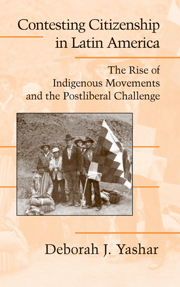 Contesting Citizenship in Latin America
Contesting Citizenship in Latin America Book contents
1 - QUESTIONS, APPROACHES, AND CASES
Published online by Cambridge University Press: 05 September 2012
Summary
Ethnic movements have (re)surfaced with the most recent round of democratization in Latin America, Southern Europe, Asia, and Africa. While these movements vary considerably, they have collectively challenged prevailing ideas about citizenship and the nation-state. In particular, they have questioned the idea that the nation-state, as currently conceived and constituted, serves as the legitimate basis for extending and defining democratic citizenship rights and responsibilities. Alongside an older set of demands for equal inclusion and access for all ethnic groups, we increasingly find demands for the recognition of group rights and ethnic self-determination.
The emergence of these movements in Latin America is particularly striking. While ethnic-based movements have a long history of organizing, protesting, and mobilizing in Africa, Asia, and parts of Europe, there has been no comparable pattern of ethnic-based organizing in contemporary Latin America, until recently. Indigenous people in Latin America have mobilized in the past, but rarely to advance ethnic-based claims and agendas. Indeed, the cultural pluralism literature often identified Latin America as the exception, the region where ethnic political debates, mobilization, and conflict did not occur. It is no longer possible to sustain this position.
During the course of the last third of the twentieth century, significant and unprecedented indigenous movements emerged throughout the Americas. An indigenous uprising shut down roads, occupied churches, and cut off commerce in Ecuador in June 1990 – marking the presence and strength of Ecuador's organized indigenous population and emerging indigenous agenda.
- Type
- Chapter
- Information
- Contesting Citizenship in Latin AmericaThe Rise of Indigenous Movements and the Postliberal Challenge, pp. 3 - 30Publisher: Cambridge University PressPrint publication year: 2005


